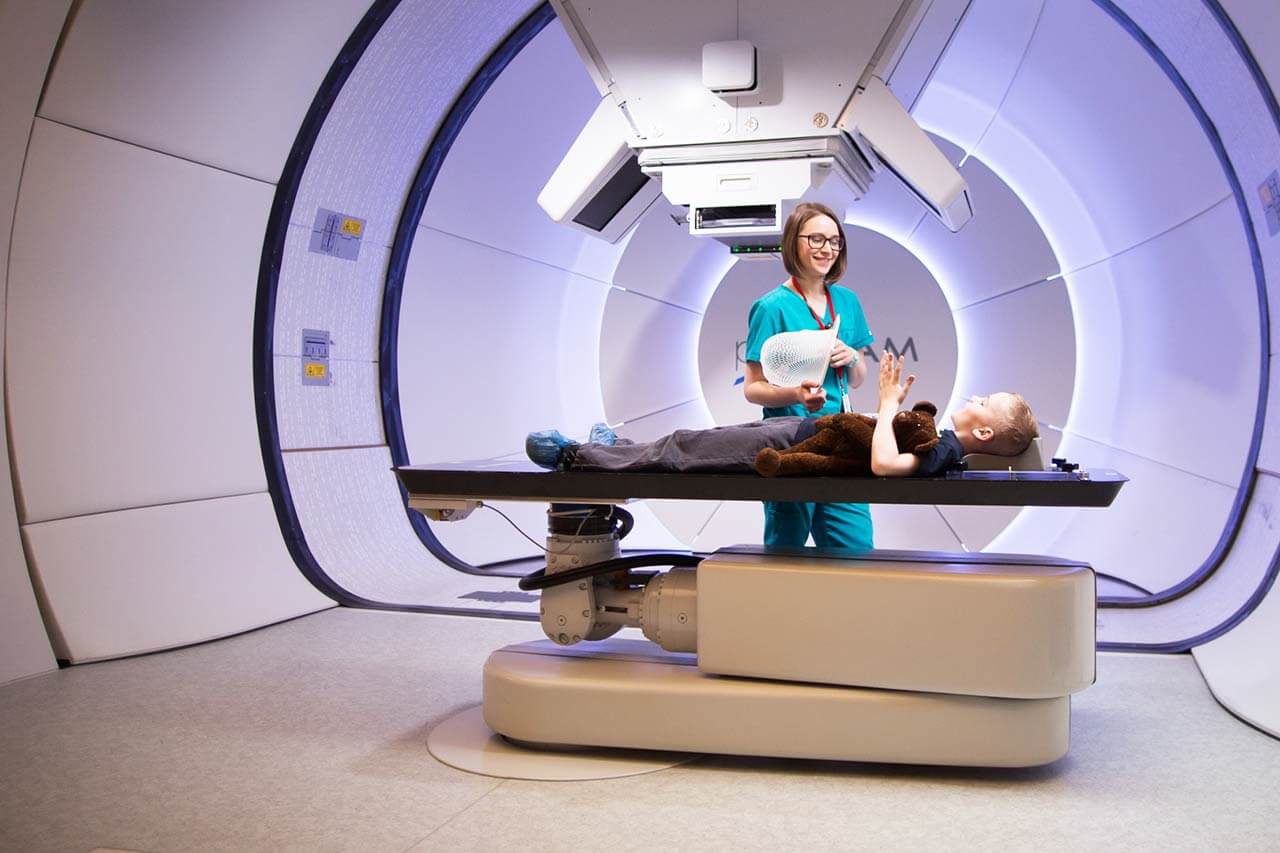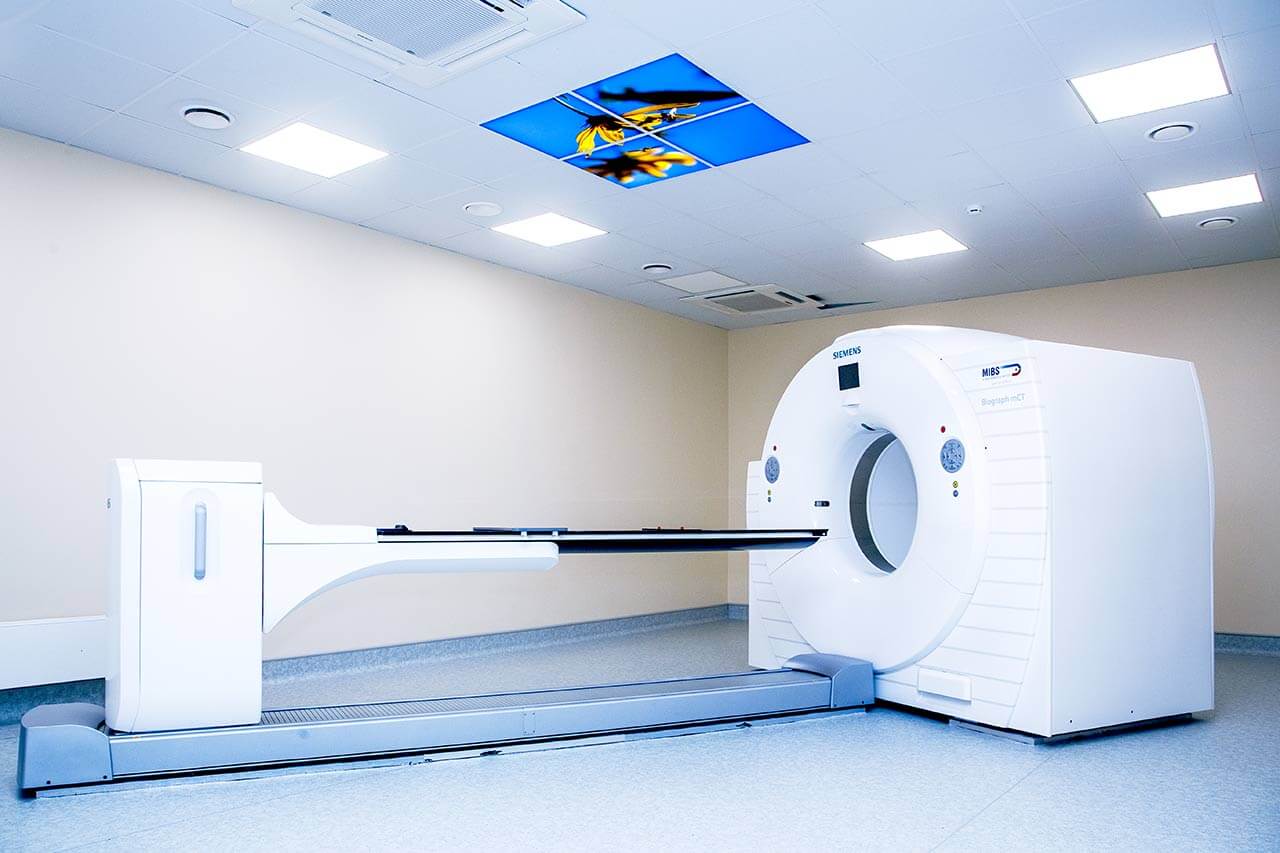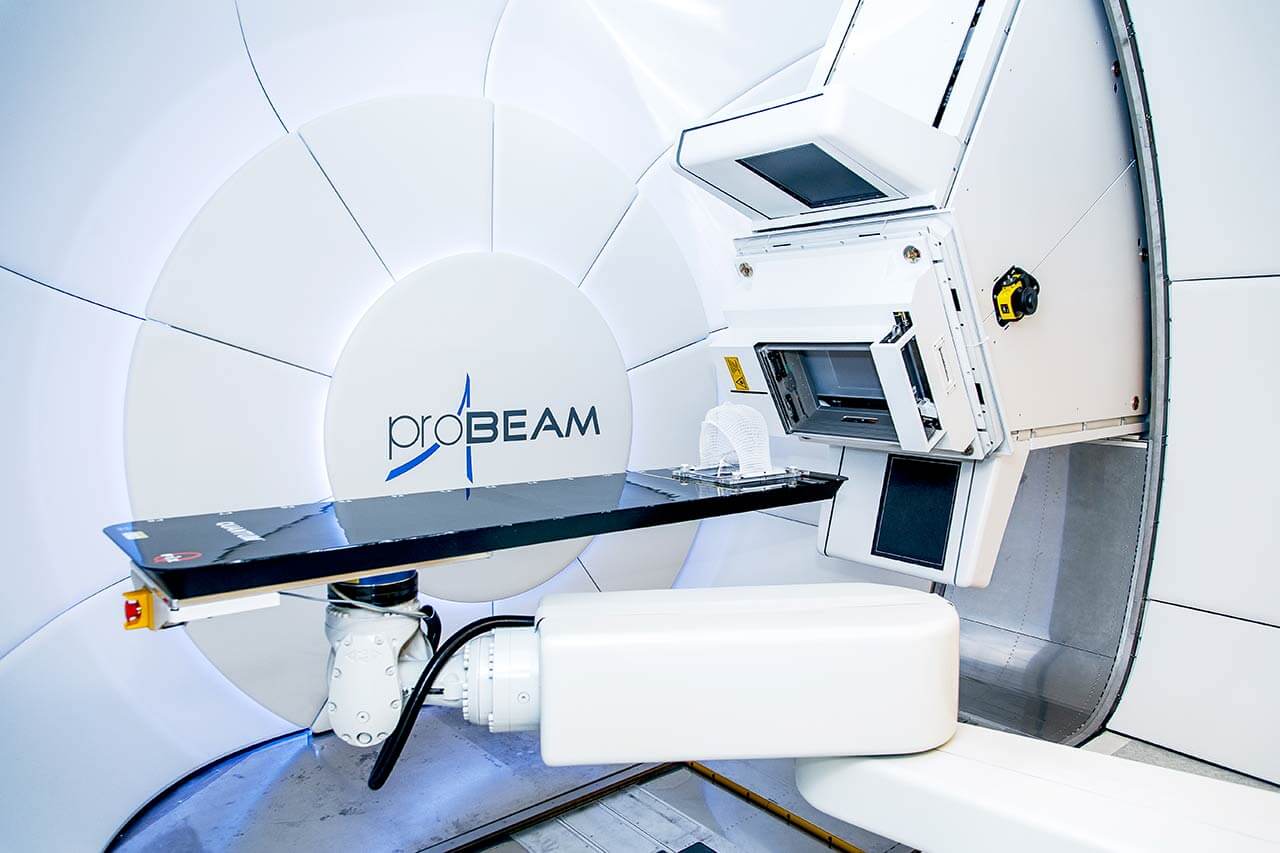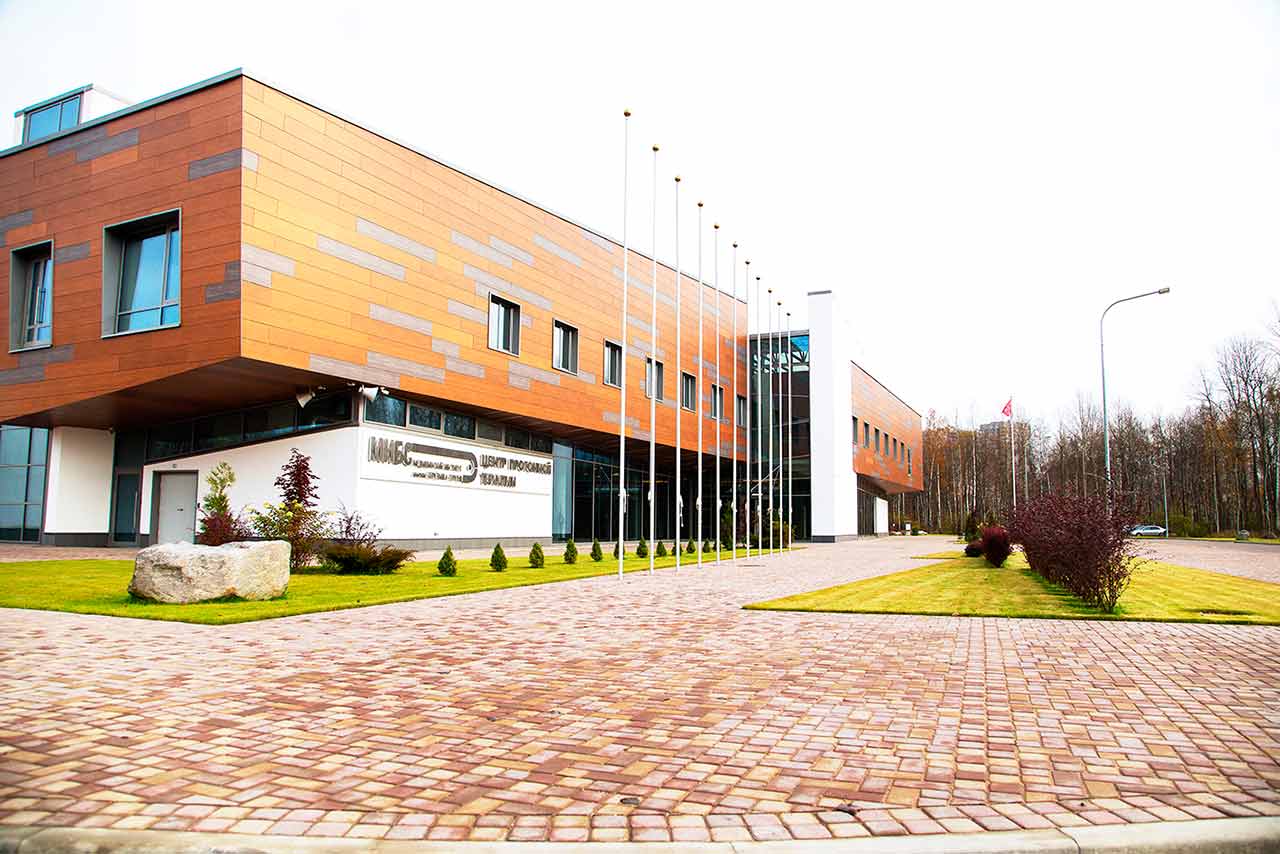
The program includes:
- Initial presentation in the clinic
- clinical history taking
- review of medical records
- physical examination
- laboratory tests:
- complete blood count
- general urine analysis
- biochemical analysis of blood
- inflammation indicators (CRP, ESR)
- indicators blood coagulation
- tumor marker
- planning of proton therapy
- a full course of proton therapy
- symptomatic treatment
- the cost of essential medicines and materials
- nursing services
- control examinations
- consultation of related specialists
How program is carried out
Proton therapy is the outpatient procedure, you do not need to stay in the hospital all the time.
During the first visit, the physician will conduct a clinical examination, go through the available medical records and CT scans. If necessary, the physician will prescribe you additional examinations in order to clarify the diagnosis and determine the localization of the tumor more accurately.
Preparation for proton therapy begins with manufacturing the special device – the individual immobilizer that will fix the position of your body during a proton therapy session. Immobility is essential for high irradiation accuracy.
After the control computed tomography, during which you will stay in the immobilizer, the healthcare professionals will develop an individual treatment scheme. The treatment scheme determines the number of proton therapy sessions, the radiation dose, the angle of the rays and the depth of their penetration. In accordance with these, technical devices are manufactured that determine the depth and form of irradiation. These are the collimator (determines the shape of the proton beam) and the bolus (determines the depth of the proton beam penetration).
After that, a trial irradiation session is carried out using the individual immobilizer, collimator and bolus. Doctors evaluate the radiation dose received by the tumor and its compliance with the treatment scheme.
Proton therapy. The procedures are carried out once a day, 5 days a week. Usually Saturday and Sunday are your free days when you do not need to visit the hospital.
Before each procedure, specialists check the position of your body using X-ray in two projections. If necessary, the irradiation is synchronized with the respiratory movements. After that, the tumor is exposed to the proton beams for 1-3 minutes. The total duration of the session with all the checking procedures is 15-30 minutes.
The procedure is painless and is performed in open-type devices (this is important for overweight people or people with claustrophobia). Proton therapy does not require bed rest or other restrictions of physical activity.
Monitoring the treatment effectiveness. After completing the treatment, you will be advised to come in for the long-term follow-up. You will visit your doctor regularly for a clinical examination and, if necessary, a CT scan.
Required documents
- Medical records
- MRI/CT scan (not older than 3 months)
- Biopsy results (if available)
Service
You may also book:
 BookingHealth Price from:
BookingHealth Price from:
About the department
The Department of Proton Therapy at the Proton Therapy Center of Dr. Berezin Medical Institute (MIBS) Saint Petersburg specializes in the treatment of cancer in adults and children using the innovative Varian Probeam system. Proton therapy is the most accurate, safest and most sparing method of radiation therapy for cancer. The technique allows the doctors to effectively destroy malignant cells by increasing the dose of radiation and at the same time has a minimal negative effect on healthy organs and tissues. The Chief Physician of the department is Dr. med. Berezina Natalia Alexandrovna.
The department's specialists annually admit more than 800 patients from Russia and other countries of the world, including Australia, Canada, Great Britain, Israel and Kuwait. The department has been operating since 2017, but in such a short time it has managed to gain an excellent reputation in the field of its competence. The treatment success rates are comparable to those of the best clinics in Europe and the USA.
The main advantage of proton therapy is that protons release the bulk of their energy exactly at the location of the cancerous tumor, which ensures its maximum destruction. At the same time, healthy surrounding tissues are not exposed to radiation. In addition, precise focusing of proton radiation helps to prevent recurrence of malignant tumors in the future. The therapy is effective in the treatment of the most complex oncopathologies, such as prostate, brain, eye tumors, as well as cancer in children. Intensity modulated proton therapy is used to deliver a high dose of protons to complex or irregular tumors that can be located near the spine, neck, inside the skull, or near the base of the skull.
The department uses two types of proton delivery to the tumor – pencil beam scanning and passive scattering. The choice of the type of proton delivery to the target area plays a decisive role in its success. Today, pencil beam scanning is a more accurate type of proton therapy, so the doctors of the department give preference to it. During the therapeutic procedure, a narrowly directed beam of protons with a diameter of less than a millimeter, controlled by numerous magnets, scans the affected area layer by layer – the process resembles shading with the tip of a sharpened pencil. The beam moves deep into the tumor, exactly repeating its shape and filling the entire volume of the treatment zone with radiation points, the number of which can range from 1,000 to 2,000 per procedure. Depending on the disease and the specific clinical situation, the course of proton therapy can include from 5 to 35 procedures, which are carried out daily, except Saturday and Sunday. Each session lasts 15 to 30 minutes, with most of this time taking up precise positioning of the patient on the gentry of the treatment table. The actual irradiation of the tumor lasts 1-2 minutes, during which the proton beam accelerated to two-thirds of the speed of light neatly shades the entire volume of the target area.
The department's doctors have been trained at leading Proton Therapy Centers in the USA, Europe and Japan. They are certified for their competence in proton therapy in adults and children. In addition, the doctors maintain close ties with many specialized Proton Therapy Centers in Europe and the United States, exchange experience and achievements. All this contributes to the achievement of the best results in the fight against cancer.
The department's range of medical services includes:
- Proton therapy in adults
- Head and neck cancer
- Tumors of the nasal cavity and maxillary sinuses
- Tumors of the mouth, including salivary glands, tongue and tonsils
- Laryngeal tumors
- Eye tumors
- Tumors of the base of the skull
- Prostate cancer
- Lung cancer
- Esophageal cancer
- Liver cancer
- Lymphomas
- Sarcomas
- Head and neck cancer
- Proton therapy in children
- Astrocytoma
- Brain tumors
- Craniopharyngioma
- Ependymoma
- Ewing's sarcoma
- Glioblastoma
- Glioma, including tumors of the optic tract and hypothalamus
- Germinoma (intracranial germ cell tumors)
- Medulloblastoma
- Meningioma
- Neuroblastoma
- Optic nerve tumors
- Retinoblastoma
- Primitive neuroectodermal tumors (PNET)
- Rhabdomyosarcoma
- Osteosarcoma
- Teratoma
- Proton therapy for other types of cancer
Curriculum vitae
Current Position
- Chief Physician of the Department of Proton Therapy at the Proton Therapy Center of Dr. Berezin Medical Institute (MIBS) Saint Petersburg.
Higher Education
- 1998 Graduated from the Faculty of Medicine of the Saint Petersburg State Medical Academy named after I.I. Mechnikov.
- 2009 Graduated from the Graduate School of Management at Saint Petersburg State University.
Scientific Publications
- Author of more than 70 publications in radiology, interventional radiology and oncology in foreign and national scientific journals.
Clinical Interests
- Management in X-ray radiography and radiology.
- Interventional radiology methods in oncology.
Memberships in Professional Societies
- European Society of Radiology.
- Russian Society of Radiology.
Photo of the doctor: (c) Proton Therapy Center of Dr. Berezin Medical Institute (MIBS) Saint Petersburg
About hospital
The Proton Therapy Center of Dr. Berezin Medical Institute (MIBS) Saint Petersburg is a progressive highly specialized medical facility, which provides cancer treatment. The medical complex is the first clinic in the Russian Federation and in the CIS countries where cancer patients can undergo innovative treatment using proton therapy. The Proton Therapy Center is part of the MIBS Cancer Center, which ranks among the leaders in the country in the field of radiosurgery and radiation therapy. The clinic has been providing its high-quality medical services for over 10 years. The Proton Therapy Center opened its doors in autumn 2017 and in a short period of time has earned prestige both in Russia and in the international medical arena.
The center has advanced equipment of the world famous manufacturer Varian, which makes it possible to carry out the most advanced radiation treatment of malignant tumors, including in children. The irradiation with protons differs from traditional (photon) radiation therapy with submillimeter accuracy, which is achieved through "pencil beam scanning" – a modern technology for delivery of a radiation dose to a tumor, which allows the doctors not to affect the surrounding healthy organs and tissues. Proton therapy is not inferior to photon one in clinical efficiency, and often even surpasses it. This therapy is characterized by a more rare development of side effects. This applies to the immediate side effects caused by radiation treatment (fatigue, headache, nausea) and long-term ones (organ dysfunction).
Proton therapy is internationally recognized as the best radiation treatment method for children with cancer, as it prevents blockage of growth areas, as well as slowing down intellectual and mental development. The risk of secondary radio-induced tumors, which are often detected in patients 10-15 years after photon treatment, is also reduced by an order of magnitude. This method of radiation therapy also demonstrates its advantages in the treatment of adults. Proton therapy is the optimal choice for the treatment of tumors located near vital organs and structures.
It is worth noting the highest competence and professional skills of the doctors and medical physicists of the Proton Therapy Center of Dr. Berezin Medical Institute (MIBS) Saint Petersburg. The specialists of the clinic have been trained at leading Proton Therapy Centers in the USA, Europe and Japan. They have developed close relations with colleagues from the Roberts Proton Therapy Center at the Abramson Cancer Center, Pennsylvania, USA, whose leading specialists regularly consult the radiologists of the clinic.
It is noteworthy that the medical center admits not only citizens of the Russian Federation, but also patients from other countries of the world, including Australia, Canada, Great Britain, Israel and Kuwait.
The convenient location of the clinic in the quiet suburb of St. Petersburg, near the urban woodlands, will also become a pleasant bonus for patients. The center is located in a beautiful landscaped green area with places for recreation and a pond. Since proton therapy does not require hospitalization and in most cases is well tolerated by patients, in spare time one can go to see the sights of St. Petersburg, which is one of the most beautiful cities in Europe.
Photo: (c) Proton Therapy Center of Dr. Berezin Medical Institute (MIBS) Saint Petersburg, (c) depositphotos
Video: (c) Proton Therapy Center of Dr. Berezin Medical Institute (MIBS) Saint Petersburg
Accommodation in hospital
Hotel
During an outpatient program, the patient can stay at the hotel of his choice. Our managers will help you choose the most suitable option.







